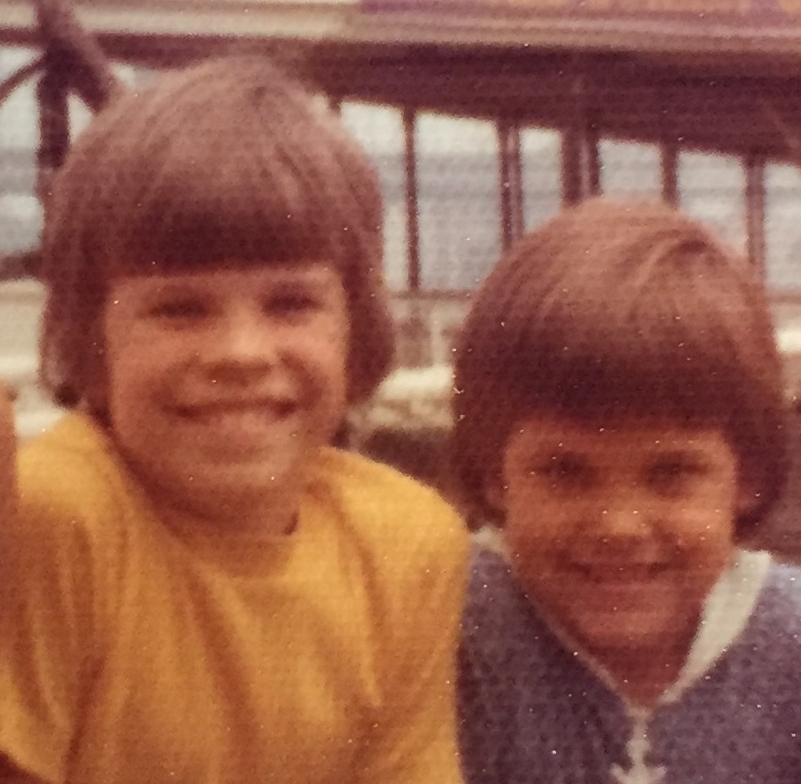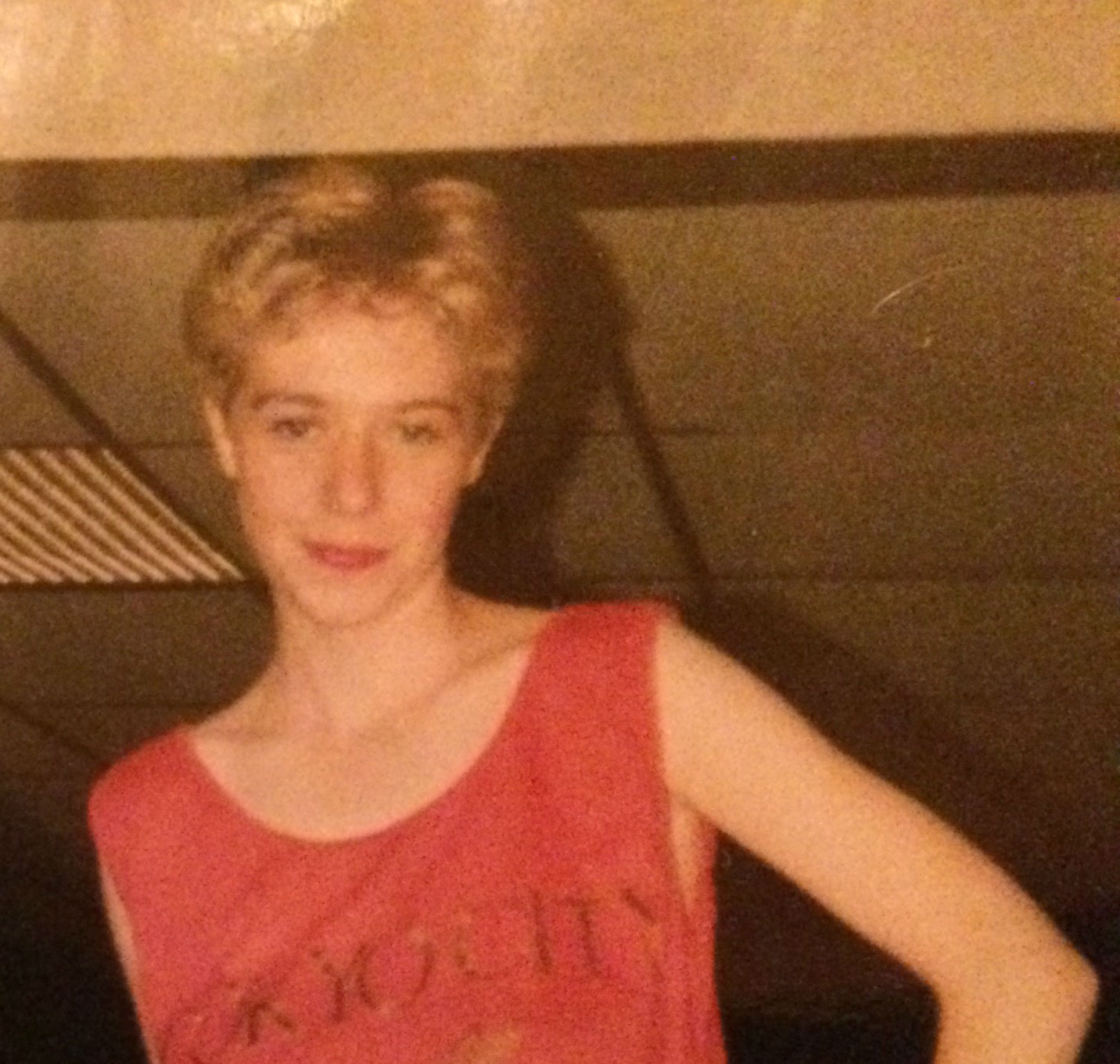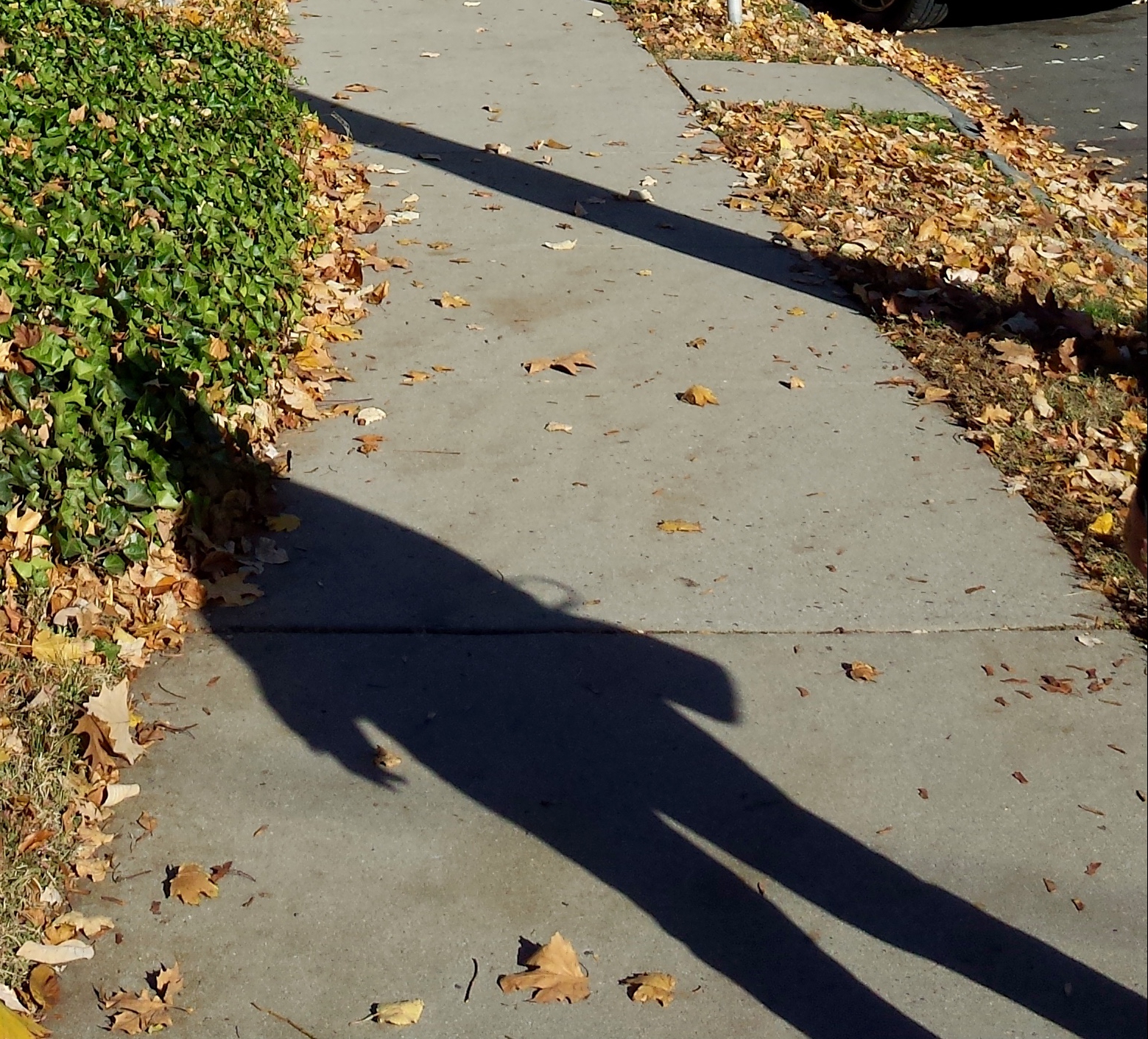“Mama, wake up, wake up Mama!” The bright September sun cuts through the room from the skylights above the bed.
“Okay, Honey, just a few more minutes. Mama’s tired.”
“Mama, if you don’t get up by the time I count to ten, I’ll get a knife and cut you.”
The sleep instantly retreats. Clear-eyed and focused, I report for duty immediately. But she is already gone, her defiant little steps echoing across the cold kitchen tiles. I blink and she’s back, standing in the doorway gripping a steak knife in the same hand that created the rainbows and butterflies that hang on the fridge in the same kitchen that houses the knife now gleaming in the morning light of my bedroom.
I inhale slowly and listen to the voice in my head, the voice of my own mother, the voice of the self I am still coming to know. I swallow hard over the unnameable emotion in my throat and stride with false confidence toward my daughter and the knife. My arm moves swiftly as I snatch it from her small hand. Her grip loosens, her jaw slackens, she surrenders.
“Go get ready for school now” I tell her.
She obeys, the damage is done, her need temporarily sated. She sings as she zips up her backpack, a little girl getting ready for school like any other. I watch her through wary eyes, questioning everything I’ve ever known.
Later, she watches me through the small, rectangular window on the bus, peering out with something akin to satisfaction tinged with regret. I am grateful for the respite as the bus lumbers down the street carrying my child into someone else’s consciousness. But even the respite has a price. Heading back into the empty house I prepare myself for the next step.
Sophie had been seeing a therapist for almost 3 years. The first one was funny and down-to-earth, and she assured me that there was no need for concern. Sophie was just headstrong and stubborn, she had said. My instinct told me otherwise, and a stack of colorful business cards in my pediatrician’s office led us to therapist number two. If therapist number one was not serious enough, therapist number two proved to be too grave in her assessment of Sophie’s issues. Almost every session included the grim words, “She’s a very ill girl.”
In addition to the weekly reminders that my daughter was very ill, there came advice, each time I reported something positive, not to get my hopes up because it wouldn’t last. The support and encouragement I so desperately needed was conspicuously absent. Instead, I internalized her negativity and approached each interaction with her with a pervasive sense of anxiety.
Today is no exception.
In an effort to push through this difficult task, I decide to call her immediately. I dial the number and attempt to keep my shame at bay. The therapist’s voice immediately weakens my façade. My own voice falters as I repeat the mantra she has taught me in rare moments of encouragement: “Always trust your own intuition. Remember that you know your child best. Don’t doubt yourself.” She is all professionalism, any trace of camaraderie a faded memory.
“You need to take her to the psych ward today.”
I blanche.
“She did it for a reaction” I tell her. “I’m certain of it.”
Sophie’s behavior was often extreme and unusual. This morning’s outburst wasn’t the first time she threatened violence. In a moment of frustration she once told me, “I will kill myself and Sam (her younger brother), and then you will have no children.” But this morning was different. She had never before followed a verbal threat with a physical one.
“You need to take her to the hospital,” she repeats without hesitation.
“But I know my child best,” I say again, using her words to form my desperate plea.
“Are you saying you know more than the experts?” she asks.
I harbor no doubt that Sophie’s “threat” was a brilliant attempt to draw something from me, to fill a void that I perhaps created, but it was in no way an actual intention. Of this I am certain.
“No, but I know my child best,” I say less convincingly. My own insecurity prevents me from giving in to my anger and frustration, and I swallow the desire to confront her with the hypocrisy of the question she has just thrown at me.
“If you don’t take her, I will have to call Child Protective Services.” The tenuous thread between us snaps.
She informs me that she will be calling Sophie’s psychiatrist, a doctor we only recently started seeing when we made the hard decision to medicate her.
I wait for my husband Dom to get home from work so that we can take Sophie to the hospital together. We tell her that she needs to see a doctor because she threatened to hurt me. It is a concept that a six year old can’t fully grasp, but she seems satisfied with the explanation. On the way to the hospital my cell phone rings. Alerted by her therapist, Sophie’s psychiatrist has no words of comfort or support. She simply says, “You have two choices. Take her to the ER or check her into South Oaks, the local psychiatric hospital.” I inform her that we are on our way to the psychiatric ER and hang up. My natural instinct to respect authority fades with the sound of her voice. I can no longer trust this person with the well-being of my family.
The familiar pediatric ER, a place of empathy and concern, no longer brings the sense of relief I felt upon entering its doors with a feverish infant. The long, cold hallway leading to the psych ward is quiet and spare, the nurse solemn and efficient, her plain, gray scrubs a stark contrast to the colorful, teddy bear-themed ones worn by the bubbly and perpetually smiling nurses in the “regular” children’s ER. She stops at the end of the hall, and three large men with short hair-cuts and muscled biceps emerge from a door on our right. Sophie clings to my leg. Dom takes my hand.
One of the men asks, “Is this the six year old?” The nurse nods, and the men, like a pack of pit bulls, step forward in one slow, deliberate move. Sophie’s grip on my leg tightens, her bravado stolen by “hospital protocol.” The men try to engage her, but she pushes her face into my thigh, willing them away and triggering every mothering instinct I ever imagined I could have. Their massive hands gently peel her miniature ones from my body, guiding her toward the door. When she looks up, her eyes, like a Margaret Keane painting, singe my soul.
A meaty arm points to a door across the hall, and a male voice says, “Go in there,” the only words we’ll hear for the next 2 hours. The room is a small, rectangular windowless box with built-in benches along the walls. We sit in near silence, the image of those three hulking men with my tiny girl, a continuous loop playing in my mind like an old, silent movie.
When an older woman opens the door and beckons us to follow her, it is nearly ten p.m.. A young male psychiatrist and female social worker greet us with smiles in a well lit office. Relieved, I immediately sense that we are no longer “suspects” and proceed with complete transparency, eager to be heard. As Dom and I catalogue the day’s events along with all pertinent psychological and behavioral history – Sophie’s diagnoses of generalized anxiety disorder, selective mutism, and possible mood disorder – it becomes apparent that they not only understand but agree with our perception of the situation. Their smiles and nods appear genuine, and when the social worker asks, “So she says and does things for shock value?” I know that she understands my daughter better in the brief time she has known her than Sophie’s therapist does after two years of therapy. Ten minutes later they bring Sophie out and tell us that we are free to return home. She is neither a threat to herself nor to anyone else.
Sophie bounces into the hallway with her shoes in her hands. She appears completely unfazed by the evening’s experience and oblivious to the trauma it has caused us.
“Mommy, they gave me pizza and let me play video games. Oh yeah, and they took my shoes. Let’s go home now.”
“Yeah Soph, let’s go home.”
The following day when her therapist calls, I am eager to share the validation I finally received at the end of an incredibly long night.
“We were there for hours,” I tell her. “They evaluated her and spoke with us and concluded that she posed no threat. They sent us home.”
“You know, the only reason they didn’t admit her is because they didn’t have enough beds,” she says, draining the smile out of my voice. And then, as if to affirm her own assertion, she adds, “She’s a very ill girl.”
Deborah L. Staunton holds a B.A. in Theatre Arts. Her love of the arts includes many years behind the scenes in stage management, lighting and other technical aspects of theatre. She also holds a B.S. in Early Childhood Education with a background in early intervention. Her work has appeared or is forthcoming in magazines and journals including, The Sondheim Review, Phoenix Soul, Sheepshead Review, Mothers Always Write, Literary Mama, The MacGuffin, Mom Egg Review and Chicken Soup For The Soul. She has written child development materials for Harcourt Learning Direct, and her essays “Promises Kept,” “An Owl In Winter,” “Anything Could Happen,” and “Shoes” placed in various writing contests. She lives in New York with her husband Dom and their two children and is currently working on her memoir, Between Love and Madness.






